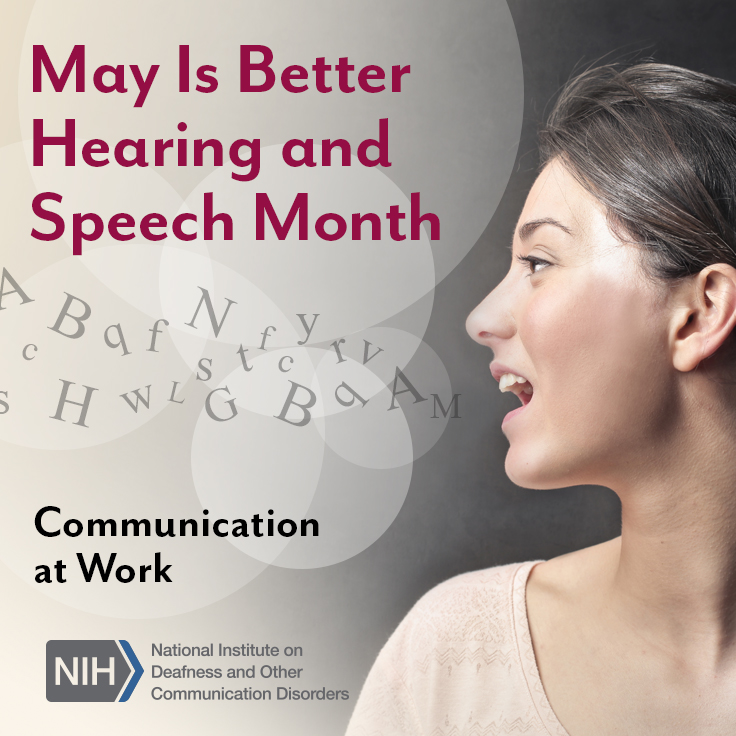
Click on the image or on this link-sharing page to use our social media sharing tools or embed the image in your website or blog. A Spanish-language version of this image is also available.
At least 46 million people in the United States have a hearing or other communication disorder. For these individuals, the basic components of communication—sensing, interpreting, and responding to people and things in their environment—can be challenging. To raise awareness about disorders related to hearing, voice, speech, or language, the National Institute on Deafness and Other Communication Disorders (NIDCD) joins the American Speech-Language-Hearing Association (ASHA) and other organizations in observing Better Hearing and Speech Month each May. This year’s theme is “Communication at Work.”
People need to communicate to perform tasks in many aspects of their lives: at school, at work, in health care settings, and during social and leisure activities. At work, your safety might depend on your ability to hear potential dangers in your environment, and your productivity might rely on your ability to clearly communicate your plans, progress, and concerns with your coworkers and supervisors. With the increased use of technology to work and communicate at a safe distance during the pandemic, overcoming communication challenges is more important now than ever before.
Millions of Americans experience a hearing disorder at some point in their life, especially as they grow older. Having trouble hearing can make it hard to understand and follow a supervisor’s instructions or a health care provider’s advice, to respond to alarms and other warnings, and to hear doorbells and phones. It can also complicate conversations with friends and family. People who work in noisy environments—such as factory or construction workers, road crews, musicians, and fitness instructors—can develop noise-induced hearing loss and tinnitus (a ringing, roaring, clicking, hissing, or buzzing in the ears) when ongoing or extreme noise exposure damages the tiny sensory hair cells in the inner ear that help transmit sound to the brain. Hearing problems can be frustrating, embarrassing, and even dangerous. A number of devices, including hearing aids and cochlear implants, can help.
In the U.S., an estimated 17.9 million adults report having a voice problem. Problems with your voice can significantly affect your ability to perform your job. Teachers, singers, lawyers, broadcast journalists, sales people, and public speakers are among those at greatest risk for voice injury, such as hoarseness due to overuse. Rest your voice when you are sick. Avoid screaming or whispering. Other voice and speech conditions, including apraxia of speech, spasmodic dysphonia, and stuttering, can also affect your verbal expression and therefore your ability to communicate at work.
Communication disorders affecting language can also be detrimental to your work life. For example, the effects of specific language impairment (SLI), a communication disorder that interferes with the development of language skills in children, may persist into adulthood. With intervention, adults with SLI may develop strategies for managing symptoms and improving their daily work, family, and social interactions. Aphasia is a disorder affecting the ability to speak, write, and understand language. Aphasia is caused by brain damage, most often due to a stroke. Although people of any age can acquire aphasia, the disorder most commonly affects middle-aged and older adults. Because many adults with aphasia return to work, rehabilitation often focuses on developing or reestablishing skills for employment.
The NIDCD supports a wide range of research that will lead to improved treatments for and prevention of disorders involving hearing, voice, speech or language.
If you experience problems with your hearing, voice, speech, or language, you have options. You can reach out to your primary care doctor or a qualified health professional such as a speech-language pathologist, otolaryngologist (ear, nose and throat doctor), or audiologist for early and appropriate care. You can also consider interventions for hearing, voice, speech, and language problems, such as hearing aids and assistive devices for hearing, voice, speech, and language disorders.
Select NIDCD resources on communication disorders:

